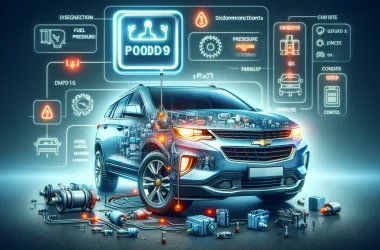In the intricate world of automotive diagnostics, nothing sends shivers down a driver’s spine quite like the illumination of that dreaded “Check Engine” light. As panic sets in, questions flood the mind: What could be wrong this time? How much will it cost me? And what in the world does this perplexing P0440 code mean?
But fear not, fellow Chevrolet owners, for we are about to embark on a captivating journey into the realm of the P0440 code, unraveling its mysteries and shedding light on this enigmatic automotive riddle. With a neutral tone of inquiry and a splash of creative curiosity, we delve deep into the inner workings of Chevy vehicles to demystify this cryptic combination of numbers and letters.
So, fasten your seatbelts and engage your inquisitive spark, as we venture into the vast realm of Chevrolet diagnostics, aiming to empower every driver who has ever grappled with the puzzle that is the P0440 code. Prepare to embark on a trail of clues, theories, and solutions, where knowledge is the key that unlocks the full potential of your beloved Chevy vehicle.
Get ready to decode the secrets hidden beneath the surface. Welcome to an article like no other, where we shed light on the P0440 code, enabling you to revitalize your automotive confidence and conquer that daunting “Check Engine” light with grace and ease.
Diagnosing the p0440 Code in Chevy Vehicles:
Common Causes and Symptoms
Common Causes of the p0440 Code in Chevy Vehicles:
The p0440 code in Chevy vehicles is related to the Evaporative Emission Control (EVAP) system, which is responsible for preventing fuel vapors from escaping into the atmosphere. When this code is triggered, it indicates a malfunction in the EVAP system. Here are some common causes of the p0440 code:
- A faulty or loose gas cap: The most common cause of the p0440 code is a loose or damaged gas cap. A loose gas cap can cause a leak in the EVAP system, triggering the code. So, it’s important to ensure that the gas cap is securely tightened.
- A damaged or leaking EVAP canister: The EVAP canister traps fuel vapors and stores them until they can be burned by the engine. If the canister is damaged or leaking, it can cause a vacuum leak in the EVAP system and trigger the p0440 code.
- A malfunctioning EVAP purge control solenoid: The EVAP purge control solenoid is responsible for controlling the flow of fuel vapors from the EVAP canister to the engine. If this solenoid is malfunctioning, it can cause the p0440 code to be triggered.
Symptoms of the p0440 Code:
When the p0440 code is triggered in a Chevy vehicle, there may not be any noticeable symptoms. However, in some cases, you may experience the following:
- A lit check engine light: The p0440 code will cause the check engine light to illuminate on the dashboard. This is an indication that there is a problem with the EVAP system.
- Reduced fuel efficiency: If there is a leak in the EVAP system, it can cause your vehicle to consume more fuel than usual. Keep an eye on your fuel efficiency and notice any significant decrease.
- A strong fuel odor: A leak in the EVAP system can sometimes result in a noticeable fuel odor, especially when the vehicle is parked or when refueling.
Understanding the Evaporative
Emission Control System (EVAP) in a Chevy
What Is the EVAP System?
The Evaporative Emission Control System, commonly known as EVAP, is an essential component found in most Chevrolet vehicles. This system is designed to prevent the release of harmful fuel vapors into the atmosphere. By capturing and storing these fumes, the EVAP system plays a crucial role in reducing air pollution and promoting a healthier environment. This complex system consists of various components, including the gas tank, charcoal canister, purge valve, and vent valve, all working together to ensure the proper management of fuel vapor.
How Does the EVAP System Work?
The EVAP system operates through a series of steps to control the emission of fuel vapors. Here’s a quick breakdown of the process:
- Fuel Vapor Capture: When your Chevrolet is running, fuel evaporates from the gas tank. The EVAP system captures these vapors and directs them to the charcoal canister for temporary storage.
- Purging the Canister: At specific intervals, the engine control module (ECM) triggers the purge valve to open. This allows the stored fuel vapor to be drawn into the engine and burned off. This process helps prevent the buildup of harmful vapors and maintains optimal fuel efficiency.
- Monitoring the System: The ECM continually monitors the EVAP system’s performance. If it detects any leaks, malfunctions, or inconsistent pressure levels, it will activate the check engine light and store a diagnostic trouble code (DTC) to help identify the issue.
Understanding how the EVAP system works is essential for maintaining the performance and emissions compliance of your Chevy vehicle. Regular inspections and timely repairs can help ensure that this vital system functions accurately, allowing you to breathe easy knowing you’re doing your part to protect the environment.
Tips to Resolve the p0440 Code in Chevy Vehicles
Having trouble with the dreaded p0440 code in your Chevy vehicle? Don’t worry, we’re here to help you resolve it with these useful tips. Instead of spending a fortune on a mechanic, try these DIY solutions that can save you both time and money.
Inspect the gas cap: One common cause of the p0440 code is a loose or damaged gas cap. Start by checking if the gas cap is tightly secured. If not, simply tighten it and see if the code disappears. If the gas cap looks damaged or doesn’t fit properly, consider replacing it with a new one.
Check the EVAP system hoses: The EVAP system in your Chevy vehicle consists of various hoses that can become cracked or disconnected over time. Inspect all the hoses and connectors in the EVAP system for any visible signs of damage. If you notice any cracks, leaks, or loose connections, it is recommended to replace or repair the affected hoses.
Effective Preventive Measures to Avoid Recurring
p0440 Code Issues in Chevy Cars
In order to prevent recurring p0440 code issues in Chevy cars, there are several effective preventive measures that can be taken. By following these steps, car owners can minimize the likelihood of encountering this frustrating issue:
- Check the gas cap: A loose or faulty gas cap is one of the most common causes of the p0440 code. It is important to ensure that the gas cap is securely tightened after refueling. If the cap is worn or damaged, it should be replaced.
- Inspect the EVAP system: Regularly inspecting the EVAP system can help identify potential issues before they trigger the p0440 code. Look for visible signs of damage, such as cracked hoses or loose connections. Additionally, cleaning the system with compressed air can help remove any debris or blockages.
- Keep the fuel system clean: Maintaining a clean fuel system is vital to prevent the p0440 code from recurring. Using a fuel system cleaner regularly can help remove carbon buildup and improve the overall efficiency of the system.
By following these preventive measures, Chevy car owners can significantly reduce the chances of experiencing recurring p0440 code issues. It is important to address any potential problems promptly to avoid damage to the vehicle’s emissions system and to ensure continued optimal performance.
Q&A
Q: What is the P0440 code for Chevy vehicles?
A: The P0440 code is a common diagnostic trouble code that is associated with the evaporative emission control system in Chevy vehicles.
Q: What does the P0440 code indicate?
A: The P0440 code specifically indicates a malfunction in the evaporative emission control system, which is responsible for controlling and capturing fuel vapors from escaping into the atmosphere.
Q: What are the possible causes of the P0440 code in Chevy vehicles?
A: The P0440 code can be triggered by various issues, including a loose or missing gas cap, a leak or blockage in the fuel tank venting system, a faulty evaporative emission control system pressure sensor, or a malfunctioning purge valve.
Q: How does the P0440 code affect the performance of a Chevy vehicle?
A: In most cases, the P0440 code itself does not directly impact the drivability or performance of the vehicle. However, if left unaddressed, it may lead to potential fuel leaks, increased emissions, and could eventually trigger other related codes.
Q: How can I diagnose the P0440 code in a Chevy vehicle?
A: Diagnosing the P0440 code usually involves a series of steps, including visually inspecting the fuel cap for any damage or looseness, checking the fuel tank and other components for leaks, conducting a smoke test to detect any potential leaks, and using a scan tool to retrieve data from the vehicle’s computer system.
Q: How can I fix the P0440 code in my Chevy vehicle?
A: The appropriate repair for the P0440 code depends on the underlying cause. In some cases, tightening or replacing the gas cap may resolve the issue. However, if the problem persists, it is recommended to consult a professional mechanic who can accurately diagnose the problem and suggest repairs such as replacing the purge valve, repairing fuel lines, or fixing any leaks in the system.
Q: Can I drive my Chevy vehicle with the P0440 code?
A: In most cases, it is safe to drive the vehicle with the P0440 code. However, it is essential to address the issue promptly to prevent potential environmental concerns, fuel wastage, or the possibility of additional troubles in the future.
Q: Can the P0440 code reappear after repairs?
A: It is possible for the P0440 code to reappear if the initial cause of the code was not properly resolved or if another issue arises in the evaporative emission control system. Thorough diagnosis and repair are important to ensure a lasting resolution to the P0440 code in your Chevy vehicle.
Q: Are there any preventative measures to avoid the P0440 code in Chevy vehicles?
A: While there is no guaranteed way to prevent the P0440 code from occurring, there are a few preventative measures you can take. Ensure that the gas cap is properly tightened after refueling, regularly inspect the fuel cap for any damage, and have the vehicle’s emissions control system checked during routine maintenance to catch any potential issues early on.
To Conclude
In conclusion, the enigmatic P0440 code beckons Chevrolet owners to embark on a journey of automotive mastery, unraveling the intricacies of their beloved chariots. While it can be disconcerting to witness this code illuminate the check engine light, fear not, for this enigmatic riddle shall be deciphered. From mischievous evaporative emissions to elusive fuel tank leaks, the P0440 code holds within it the key to unlocking the secrets of your vehicle’s inner workings.
As you delve into the world of diagnostics, armed with your newfound knowledge, remember to stay resolute in your quest for resolution. For in the realm of automotive complexities, patience and perseverance are the compass guiding you towards success.
So roll up your sleeves, put on your metaphorical detective hat, and traverse the intricacies of your beloved Chevrolet. Embrace the challenge posed by the P0440 code with an adventurous spirit, seeing it as an opportunity to deepen your understanding and connection with your chariot on wheels.
As you navigate the path to resolution, seek the wisdom of skilled technicians, explore online communities, and tinker with your own hands. Remember, the journey itself is just as intriguing as the destination, and each twist and turn provides an opportunity to grow in your automotive prowess.
Ultimately, with a relentless pursuit and a touch of ingenuity, you shall conquer the P0440 code, returning your Chevrolet to its former glory. So fear not, intrepid troubleshooters, for the road to triumph lies ahead. The enigmatic P0440 code shall be vanquished, and your Chevrolet shall once again roam the streets, a testament to your unwavering dedication and automotive aptitude.
With the code resolved, allow the pride of a mechanical conqueror to wash over you. Bask in the satisfaction of defeating this automotive nemesis, knowing that you have emerged victorious from this battle of wit and skill.
So, go forth, fellow Chevrolet enthusiasts, armed with this newfound knowledge, and unravel the mysteries of the P0440 code. Let your creative spirit and neutral tone guide you through the intricate tapestry of automotive triumph. The road to resolution awaits – may your journey be as captivating as your destination!
Title: Diagnosing and Resolving the P0440 Code in Chevrolet Vehicles
Introduction:
When the check engine light illuminates on your Chevrolet vehicle’s dashboard, it is important not to ignore it. One of the possible trouble codes that could occur is the P0440 code. This code is specifically related to the evaporative emission control (EVAP) system, which is responsible for preventing harmful fuel vapors from escaping into the atmosphere. Understanding the nature of the P0440 code and its implications is vital for maintaining the performance and environmental integrity of your Chevy.
Understanding the P0440 Code:
The P0440 code implies a generic Evaporative Emission Control System Malfunction. Although it specifically relates to the EVAP system, it does not precisely pinpoint the source of the issue. The code is often triggered by a leak or malfunction in the evaporative emission system, which can compromise the vehicle’s fuel efficiency and overall performance.
Causes of the P0440 Code:
Several factors can contribute to the activation of the P0440 code in Chevrolet vehicles. Some common causes include:
1. Loose, damaged, or missing gas cap: A loose or improperly sealed gas cap is one of the most common reasons for the P0440 code. A faulty or missing gas cap can create a vacuum leak, causing the EVAP system to detect a large leak.
2. EVAP system leaks: Other components of the EVAP system, such as hoses, valves, or charcoal canisters, may develop leaks due to wear and tear, aging, or improper installation. These leaks can result in a P0440 code.
3. Faulty purge valve or vent valve: The purge valve and vent valve regulate the flow of fuel vapors between the fuel tank and the engine. If either valve malfunctions, it can cause the P0440 code to appear.
Troubleshooting and Resolving the P0440 Code:
1. Start by inspecting the gas cap: Ensure that it is tightly secured and in good condition. Replace the gas cap if it appears damaged or worn.
2. Check for leaks in the EVAP system: Examine all hoses, valves, and canisters connected to the EVAP system for signs of damage or leaks. If any components are found to be faulty, they should be repaired or replaced accordingly.
3. Test purge valve and vent valve: Using a scan tool, activate and monitor the operation of these valves. If they fail to open or close as required, they may need to be replaced.
4. Clear the code: After resolving the underlying issue, use a suitable scan tool to clear the P0440 code and reset the check engine light.
Seeking Professional Assistance:
While checking and replacing the gas cap or inspecting hoses may be relatively straightforward, diagnosing and repairing more complex issues within the EVAP system often requires professional assistance. Certified technicians possess the necessary tools, expertise, and resources to accurately diagnose and resolve the P0440 code in Chevrolet vehicles.
Conclusion:
The P0440 code should not be overlooked, as it indicates a malfunction in the EVAP system of your Chevrolet vehicle. By understanding the potential causes and following appropriate troubleshooting steps, you can rectify the issue and ensure the vehicle operates efficiently while minimizing its environmental impact. If uncertain or unable to perform the necessary repairs yourself, seeking professional help is the best course of action for effectively addressing the P0440 code in your Chevy vehicle.

A Boston University Electrical Engineering graduate.
Electronics designer for EV giants like Tesla, BMW, VW, and Ford.
Enthusiastic Wikipedia moderator in the automotive category and author of automotive articles.
Passionate about tech, travel, and cars.





